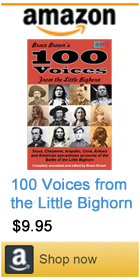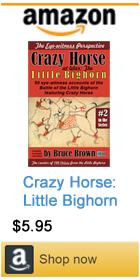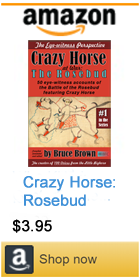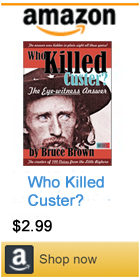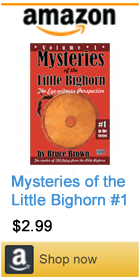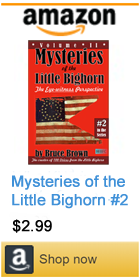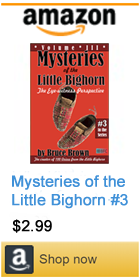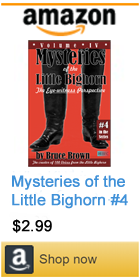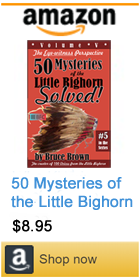|
||||||||||
Bruce Brown's 100 Voices... Theo. W. Goldin's Story of the Battle, #1
THE STORY OF THEO. W. (FRED) GOLDIN
One of the Last Men to See Custer Alive R. THEODORE W. GOLDIN, of Janesville, Wisconsin, formerly a trooper of the Seventh Cavalry, now Chairman of the Republican State Central Committee of Wisconsin, was the last, or perhaps the next to the last, man to see Custer alive. [Note: actually, the last Seventh Cavalry survivor to see Custer alive was Peter Thompson. See Who Killed Custer - Top 10 List for the complete list and sequence of the last five survivors who saw Custer alive.] He has prepared an account of his personal experiences in the battle, which is one of the most interesting of the contributions that have been made to this volume. His description of the death of Hodgson is splendidly dramatic, as is his story of the brief conversations between Custer and Keogh, Reno and Weir, and Benteen and Wallace. What a magnificent picture is that presented by Hodgson, determined to retreat no longer, facing about, drawing his revolver, and dying at last, face to the foe, weapon in hand! Mr. Goldin contradicts the popular impression, as repeated by Colonel Godfrey and others, that Reno threw away his pistols in his "charge." * * * Milwaukee, Wis., August 11, 1904. My Dear Sir: I am in receipt of your letters of July 28th and August 2d, asking me for a few reminiscences of personal experiences and touching on my acquaintance and knowledge of Gen. Custer and his last fight. The years that have elapsed since that stirring event may have somewhat dimmed my recollections, and the time at my disposal at this time is so very limited, that what I may say must, of necessity, be somewhat fragmentary. Your articles on this subject, as well as the entire series, have been read with great interest, and I am very much pleased to know they are to be published in book form. In reply to your request, I will say that I had known Gen. Custer from the time I joined the regiment in 1873 up to the time of his tragic death, and had campaigned with him and with the regiment with the exception of the year 1875, when the troop to which I was attached was stationed in the South. Early in the spring of '76, we received word that an expedition was being organized against the Sioux, and that three large columns were to take the field, and a few weeks later our marching orders came, and our battalion changed station from near Shreveport, La., to Fort Lincoln, D. T. At the time of our arrival Gen. Custer was in Washington before some investigating committee, and only joined the regiment a few days before our column took the field, he having been ordered under arrest at Chicago while en-route from Washington. I will not take the time or space to touch on our march from Fort Lincoln to the Yellowstone, which we struck near the mouth of the Powder River. Here we remained a few days while outfitting our pack train, as it had been determined that we would abandon our wagons here and establish a supply camp. Maj. Reno had left us a few days before on a scout, expecting to rejoin us near the mouth of the Tongue River on June 17th. After arranging to leave our wagon train and some dismounted recruits and the regimental band at the Powder River, we moved camp to the mouth of the Tongue, where we lay on the 17th of June, the day on which Gen. Crook had his big fight with the Indians on the Rosebud. During the day we watched every distant dust cloud that whirled across the river bottom, hoping that it meant the approach of Maj. Reno's command, but as nothing was heard from him, we broke camp on the morning of the 18th and moved up the valley, where we effected a junction with Reno soon after noon. During the previous days we could not help but note the fact that Gen. Custer seemed moody and discontented, and, entirely different from his usual habit, appeared nervous and excited to some extent. When Reno came in with his report he became a changed man. His old-time energy and snap were made apparent by the manner in which he hustled the command into marching order and took the trail for the Rosebud, where Gen. Terry on our supply steamer the "Far West" had already preceded us in the hope of striking the command of Gen. Gibbon, who was known to be somewhere in that vicinity. Our march was prolonged far into the night, but we finally struck the Yellowstone and went into camp, assured that if the steamer was below us we were bound to intercept it. The following morning we were in the saddle early, and soon after noon we sighted the wagon train of Gen. Gibbon's command moving slowly up the river and a few moments later the "Far West" steamed into sight. Couriers were sent out to advise them of the fact that Reno had discovered the trail of a considerable body of Indians, and in a short time we were in camp near the mouth of the Rosebud and a council of war was held at which we understood that Reno's report was discussed in detail. The following day arrangements were made for a vigorous campaign. A final council was held on the steamer on the night of the 21st, as I now recollect it, at which time Gen. Custer received his final orders, substantially as you have stated them. At this council, and just about the time it was breaking up, the question was asked Gen. Gibbon as to what time he could reach the mouth of the Little Big Horn River, and he replied, "Not before noon of the 26th." At this conference it was reported that Custer had been offered the battalion of the Second Cavalry and the artillery which had been brought up on the steamer, but declined both, claiming that he knew his command so well that he preferred to trust himself with them alone, and that he feared the artillery might delay his march when nearly in presence of the enemy. Many of the officers and men felt that it was but a part of a preconceived scheme to secure an independent command, such as he had been used to having for years, but be that as it may his request was granted. On the afternoon of June 22d we passed in review before Gen. Terry and Gen. Gibbon, and soon struck the trail described by Maj. Reno. From that time until Reno struck the Indian village we did not deviate from it except when it became necessary to find a satisfactory camping ground. No attempt was made to scout the country as we had been directed to do, nor was any attempt made to send a courier across to Gen. Gibbon, although a man named Herndon [George Herendeen], a scout, had been attached to our command for that purpose. Our marches were long and our movements very rapid until the night of the 24th, when we moved off the trail some distance and apparently settled down for the night. But this was only a ruse to mislead the Indians, as we had received orders not to unpack our saddles and to be prepared for a night march. From the hour we left the Rosebud Gen. Custer acted in many respects like another man, his old-time restless energy had returned, and he seemed to think of nothing but to reach and strike the Indians. In this connection it might be well to say that the trail we were following led from the direction of the Missouri River and indicated, according to the estimate of Bloody Knife and some of our Crow scouts, a band of from a thousand to twelve hundred Indians, whom we afterward learned came from the Missouri River agencies and consisted almost entirely of warriors. About eleven o'clock we received word to saddle up and lead into line. In the meantime a scouting party of Crows and Rees, with some of our officers, Lieut. Varnum and, I think, Lieut. Hare, had pushed on ahead of us to scout the trail across the divide and seek to locate the Indians if possible. Leaving our bivouac, we again struck the trail and pushed forward, seeking to cross the divide and get into the shelter of the foothills along the Little Big Horn before daybreak the following morning. Owing to the roughness of the country and the difficulty in scouting the trail, we were unable to do this, and daybreak found us in a ravine at the foot of a range of high bluffs, just how far from the river we did not know. Some time during the night it was said Gen. Custer had pushed ahead and joined the scouts, and that just after daybreak they told him they had located the village in the valley of the Little Big Horn, but Gen. Custer replied that he did not believe them. In the meantime it became apparent that our presence in the country was known, as, during the night a box of ammunition had been lost and a detachment sent back to recover it came across some Indians trying to open the box. [Note: actually the errant box contained hardtack, and Sgt. Hearst's murder of the Sioux boy who found it was the first death of the battle.] On this being reported to Gen. Custer, he seemed to decide on an immediate advance. In the talk, just about the time the division was made in the command, Mitch Bouyer, a half-breed Crow interpreter, said to Gen. Custer that he would find more Indians in that valley than he could handle with his command. Custer replied that if he (Bouyer) was afraid to go he could stay behind. Bouyer replied that he was not afraid to go wherever Custer did, or something to that effect, but that if they went in there neither of them would come out alive. Just before the advance was made I was detailed by Lieut. McIntosh to report to Gen. Custer for duty as orderly, and at once did so. The general directed me to ride with Lieut. Cook, our regimental adjutant, and perform any duties he might assign to me. During our brief halt the men had thrown themselves on the ground and were most of them asleep, while the horses were grazing among the sage brush. Gen. Custer ordered the advance, saying that the company in each battalion first ready should have the right of the line, and in a few minutes we were all in the saddle. During the halt it had been ordered that Benteen with his battalion should move off to the left, scouting the country in that direction, driving before him any Indians he might discover, and sending word to the command of anything he might find. Reno was to follow the trail, while Gen. Custer with the five troops under him struck off to the right, leaving McDougall with the pack train to follow as best he could. We immediately took up the line of march in accordance with these orders, and after probably a half hour's hard ride the impassibility of some of the hills and ravines forced the column under Gen. Custer to veer off to the left and we soon came up with the command of Maj. Reno, which was pushing ahead on the trail as fast as the roughness of the ascent would permit. After a hard climb we reached the top of the ridge, where we saw before us a rolling plateau sloping off toward the foot-hills of the river, which was perhaps some five or six miles away. As our command dashed over the divide we could see Reno some distance in front of us, moving rapidly down the trail, while several miles to our left was the command of Col. Benteen, scouting the bluffs as he had been ordered. For some distance we followed the general course of Reno's advance, but were some distance in his rear and to his right. To those of us who were near him it seemed that Custer was chafing at the apparent slowness of our advance, as he would at times dash ahead of the column and then rein in and await our approach and again off he would go. Just about this time we discovered a huge dust cloud moving down the river valley, but could not determine the nature of it. As soon as this was discovered Custer rode over toward the river accompanied only by his orderly trumpeter, and stopped for a moment on the top of a high pinnacle, where we saw him wave his hat, apparently in salutation to some one in the distance, and then come dashing back toward the head of the column, which was headed by Capt. Keogh and "I" Troop, veterans of a dozen fights. [Note: White Man Runs Him also described Custer grandly waving is hat to his men below. Medal of Honor winner Stan Roy was one of the men with Reno who saw Custer on the bluff.] With his eyes snapping in his excitement, Custer rode up to Keogh and said, somewhat excitedly: "Keogh, those Indians are running. If we can keep them at it we can afford to sacrifice half the horses in the command." [Note: This echoes what Half Yellow Face told Custer.] Calmly as though on dress parade, Keogh turned in his saddle and looked back at the long line of eager, bronzed, bearded faces, Keogh turned to Custer with the remark "General, we will do all that man and horse can do." A moment later the bugles blared out the charge, the first bugle note we had heard since leaving the Rosebud, and away we thundered northward down the river, two or three times seeking to find a place where we could work down into the valley below us, but without success. After perhaps the third unsuccessful trial, Gen. Custer talked hurriedly with Capt. Cook [W.W. Cooke] for a moment, and Cook pulled out his pad and dashed off a line or two, which he folded up, at the same time calling for an orderly. I happened to be the first one to reach him, and he handed me the paper with the order. "Deliver that to Maj. Reno, remain with him until we effect a junction, then report to me at once," and he was gone. An instant later the rear of the column dashed past me and was lost to sight in the ravines. For an instant I looked after them, and then realizing that I was in a dangerous country and alone, I lost no time in heading in the direction of Reno's command, which I was able to locate by the dust cloud that hovered over them. Fortunately, I was not molested to any great extent. A few long-range shots were fired at me, which only served to accelerate my speed and materially added to my desire to be among friends. A ride of some five or six miles and I overtook Reno just as he was dismounting to fight on foot. I delivered my dispatch, the contents of which I did not know. Reno glanced at it somewhat hurriedly and stuck it in his pocket. About this time the Ree scouts stampeded and, as we afterward learned, did not recover their sand until they reached the Powder River and the shelter of the wagon train. It soon became apparent that the Indians were passing our flank and coming in behind us, and we were forced to face about and endeavor to repel their advances until we could get our horses into the timber, in which attempt several horses were shot and two or three stampeded. Soon after this we retired into the timber, where we had better protection and resumed the fight. Sheltered by the timber and the river bank, we were able to make a much better defense for a short time. Soon after this we noticed that Capt. Moylan was mounting his troop and Lieut. Wallace, who stood near me on the skirmish line, called to Capt. French, who was commanding the center company, and asked what the orders were. French replied that he hadn't received any but would try and find out, and in a few minutes he called to us saying he understood they were going to charge, that he had not received any orders, but we might as well mount and support them. We were ordered to get to our horses, and while doing this we found that some fifteen of our men were dismounted either because of the shooting or stampeding of their horses. Lieut. McIntosh had lost his horse and took one belonging to a trooper named McCormick, who gave him up with the remark that we were all dead anyway, and he might as well die dismounted as mounted. Swinging into the saddle, we moved out of the timber and to our surprise discovered that instead of "charging the Indians" Reno was executing a masterly charge on the bluffs on the opposite side of the river. As soon as the Indians discovered this, they massed on our flanks and opened a heavy fire on the retreating column. Fortunately, they were poor marksmen mounted, and our loss was comparatively small at this stage of the stampede, for that is what it was. It is reported that Reno became so excited that he emptied his revolver at the Indians and then threw the weapon from him. I happen to know this was not so, as the revolver is now in the possession of Gen. Benteen or his family, or was a few years ago. During the progress of this retreat I was riding on the left of our column and near the timber, and when almost in sight of the river my horse fell, throwing me into a bunch of sage brush, but without doing me serious injury save to exterior cuticle. As I scrambled to my feet Lieut. Wallace passed me, shouting for me to run for the timber as my horse was killed. I did not stop to verify his report, but took his advice, striking only one or two high places between where the horse fell and the timber, which I presently reached.
In the meantime our men had succeeded in crossing the river and made their way up a neighboring ravine, all save those who had met their fate at the ford, which was one of the worst along the river for many rods. Left alone, I began to wonder what my own fate was likely to be, but I was not observed and therefore not molested, the Indians being busy stripping and mutilating the bodies of our dead along the banks of the stream. About this time I could hear sounds of heavy firing down the river, and made up my mind that Custer was engaging the Indians, and from the momentary glimpses I had of the village I felt that he was as badly outnumbered as we were. Most of the Indians in our front melted away and I could see them lashing their ponies as they hurried to join their friends at the lower end of the village. About this time I saw the scout, Herndon [George Herendeen], some little distance from me, making his way toward the river, and called to him, and we were soon together. He told me that the fifteen dismounted men of our outfit had made their way to a point in the timber about a couple of hundred yards from where we were, but that in order to get nearer the river they had to cross an open space and every time they tried it the Indians fired on them. Before leaving us the Indians had set the river bottom on fire, evidently with a design of concealing their movements, or of smoking or roasting out our wounded. This smoke proved to be our salvation, as under its cover we made our way to the river, forded it with some difficulty, and stumbled on to one of our Crow scouts, who pointed out to us the location of the command, which we soon joined. We found that Benteen and his battalion had reached it and that nothing was known of the location of Custer and his command. We reported what we had heard and seen, and just about this time some one discovered a white flag waving from a point in the river bottom near where Herndon and myself had been concealed. Lieut. Hare, at the risk of his life, crept down to a point of bluffs overlooking the valley, and after considerable signaling satisfied the party we were friends and they made their way across the river and soon joined us, proving to be the dismounted men who had been left to their fate when Reno made his retreat. I omitted to state that when we started on our retreat Lieut. McIntosh, mounted on McCormick's horse, was several rods in front of me and I noticed that in some way his lariat had become loosened and was dragging on the ground, the picket pin striking sage brush and other obstacles, and rendering his immediate vicinity very dangerous. Several of the men sought to call his attention to it, but evidently he did not hear them. A moment after this I saw his horse go down, but whether he was shot or not I do not know. All I could see as I passed was that the lieutenant was lying where he fell, and was either dead or stunned, probably dead, as we found him in the same place the day after the Indians left us. As we were standing on the bluffs looking down into the valley I heard some loud talk near me, and turning in that direction, I heard Capt. Weir say: "Well, by G-d, if you won't go, I will, and if we ever live to get out of here some one will suffer for this." He strode away, and a few moments later I saw "D" Troop mount up and move down the valley in the direction of the distant firing. Apparently without orders, the entire command followed them in no sort of military order with the exception of the two troops under Benteen and Godfrey. In this way we pushed down the valley some distance, when we discovered Weir and his troop falling back before a largely superior body of Indians.
"Wallace, there is no use falling back any further. Form your troop, your right resting here, and we will make a stand." Wallace grinned and said, "I haven't any troop, only two men." Benteen laughed grimly and answered, "Form yourself and your two there, and I will tell you more about it when I find out myself." That was the nucleus of our line of defense. Others soon joined us and we sheltered ourselves behind sage brush and hurriedly heaped piles of dirt and opened fire, keeping the Indians at a respectable distance until dark ness came to our relief. During the night we changed our position a trifle, located our corral and hospital, and put in the night intrenching ourselves as best we could. At daybreak the fight opened again and continued without intermission until about three in the afternoon, when to our surprise the Indians began to take down their tepees, pack their travois, and in a few hours were moving up the river valley, a great mass of ponies, travois and Indians, unfortunately just out of rifle range. Twice during the afternoon volunteer parties had gone for water, each time being fired upon by the Indians, but it was only on the second trip that any one was hit. Poor Madden, of "K" Troop, was the unfortunate, his leg being shattered three times between the ankle and the knee. We carried him back to the hospital, where his leg was amputated that night. On the following day Gen. Terry and Gen. Gibbon came to our relief, and through them we received the first authentic information as to the fate of our comrades of the other battalion. On the 28th, after having transported our wounded across the river, we visited the scene of the battle and buried such of Custer's men as we found. Aside from General Custer, we found hardly a body on the field that had not been mutilated in some manner or another, but as I recollect now, we found no marks of mutilation on our dead leader. In the space at my disposal it is not possible to deal in incidents of the fight or go into detailed descriptions. In fact, those have been well covered in your article already. Since the fight I have discussed it with many officers of the army, and others who have had experience on the frontier, and the general opinion seemed to be that there were two, possibly three, main causes for this disaster. First: A division of the command into practically four separate columns while still some fifteen miles from the battle-field, and without accurate knowledge as to the exact location or approximate strength of the enemy, and the separation of those columns so that at a critical period of the fight no two of them were in supporting distance of one another. Second: The fact that Custer came into the presence of the enemy practically twenty-four hours ahead of time. Third : The loss of the horses and with them much of the surplus ammunition of Custer's command. This subject has been so often discussed by men much abler than myself that I will not attempt it here. My experiences with Gen. Custer always led me to look upon him as somewhat recklessly brave, disposed to take chances without fully considering the odds against him. I have always felt that one possible reason for the course he followed, in the face of the orders he received, might be attributed to the fact that he was feeling keenly the apparent disgrace of the treatment accorded him by the President, and that he thought that by a brilliant dash and a decided victory, similar to his Washita fight, he might redeem himself and once more stand before the people as a leader and an Indian fighter second to none. Whatever may have been his motive, we must all admit that he made a most gallant fight and gave his life at the side of the comrades who had ridden with him to victory in many a previous battle. Very truly yours, Indian Fights and Fighters by Cyrus Townsend Brady, McClure, Philips & Co., New York, NY 1904 p 263 - 278
|
||||||||||



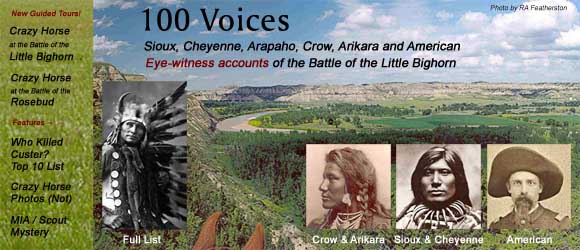
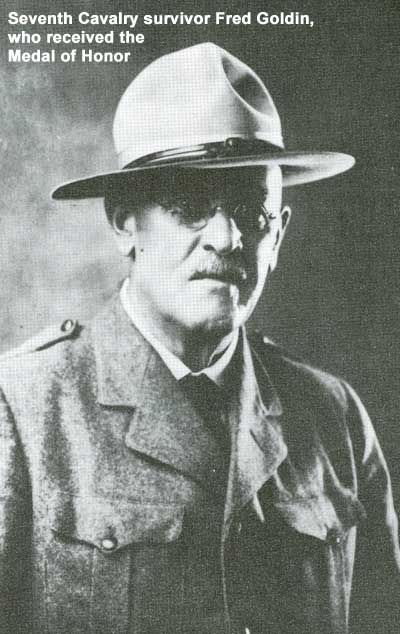 CHAPTER SIX
CHAPTER SIX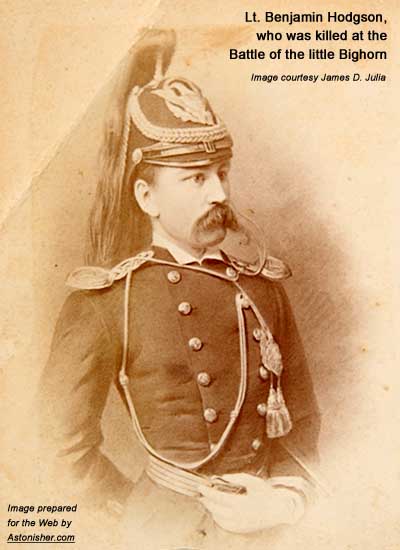
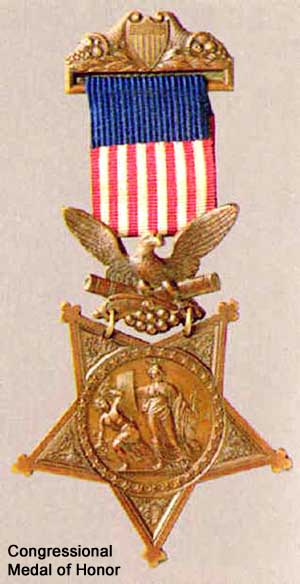 Hastily forming a line, we held back the advancing horde until Weir and his command had passed our lines and formed some distance in our rear, where, with the support of some of our men who were near them, they formed a line and opened fire, permitting us to fall back and re-form again in their rear. In this way we fell back some little distance, when Col. Benteen, who seemed to be the leader in our section of the field, spoke to Lieut. Wallace, saying:
Hastily forming a line, we held back the advancing horde until Weir and his command had passed our lines and formed some distance in our rear, where, with the support of some of our men who were near them, they formed a line and opened fire, permitting us to fall back and re-form again in their rear. In this way we fell back some little distance, when Col. Benteen, who seemed to be the leader in our section of the field, spoke to Lieut. Wallace, saying: